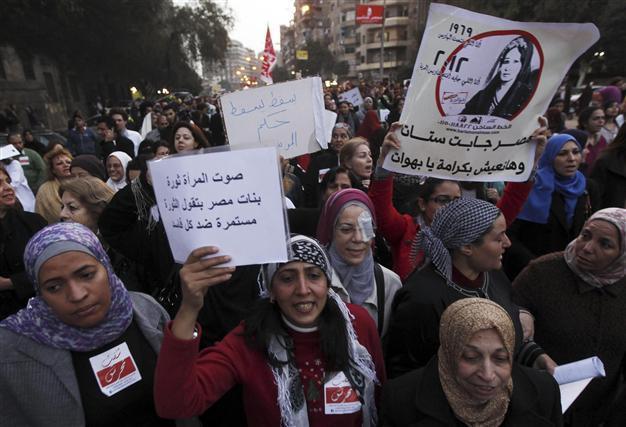Protesters head to Tahrir Square ahead of rallies
CAIRO - Agence France-Presse

Women shout slogans against Egyptian President Mohamed Mursi and members of the Brotherhood during a march against sexual harassment and violence against women in Cairo February 6, 2013. REUTERS photo
Demonstrators made their way to Cairo's Tahrir Square after opposition groups called for "Friday of dignity" rallies to protest religious edicts sanctioning the death of opposition figures.
Protests against Islamist President Mohamed Morsi have also been organised after the weekly Friday Muslim main prayers outside the presidential palace and in several of Egypt's 27 provinces.
Thirty-eight opposition parties and movements have called for the rallies, demanding a new unity government, amendments to the Islamist-drafted constitution and guarantees that the independence of the judiciary be maintained.
Preparations were underway in Tahrir Square, as protesters hung up banners slamming Morsi and his Muslim Brotherhood and set up the main speakers' podium.
Friday's planned protests come just days after clerics issued fatwas to justify killing opposition leaders.
Radical cleric Mahmud Shaaban, a professor at Sunni Islam's main seat of learning Al-Azhar, gave the green light to kill opposition leaders including former UN nuclear watchdog chief Mohamed ElBaradei and ex-presidential candidate Hamdeen Sabbahi, during a talk show on a satellite channel.
Another hardline cleric, Wagdi Ghoneim, also called on Muslims to "kill the thugs, criminals, and thieves who burn the country," state media reported.
Security was stepped up outside the homes of ElBaradei and Sabbahi ahead of the protests, witnesses told AFP, following orders from the interior minister.
The presidency condemned the fatwas as "terrorism".
"Some are promoting and inciting political violence while others who claim to speak in the name of religion are permitting 'killing' based on political differences and this is terrorism," the presidency said.
In recent months, Egypt has witnessed regular, often bloody, protests against Morsi who is accused of betraying the revolution that brought him to power.
Opponents have criticised him of using his power to promote the interests of his Muslim Brotherhood, long banned under his predecessor Hosni Mubarak.
The country has been deeply divided between Morsi's mainly Islamist supporters and an opposition of liberals, leftists, Christians but also deeply religious Muslims calling for rights and the separation of religion and state.
